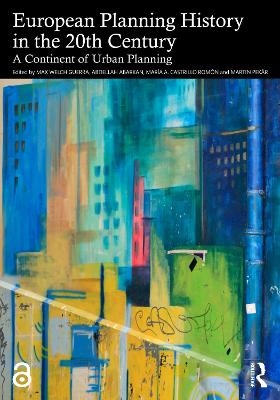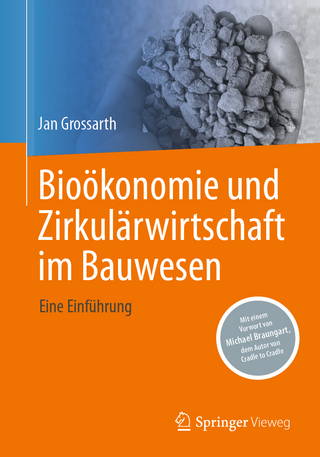
European Planning History in the 20th Century
Routledge (Verlag)
978-1-032-22227-1 (ISBN)
This book searches for an understanding of the historiography of planning in a European dimension. Scholars from Eastern and Western, Southern and Northern Europe address the issues of the public led production of city and the social functions of urban planning in capitalist and state-socialist countries. The examined examples include Poland and USSR, Czech Republic and Slovakia, UK, Netherlands, Germany, France, Portugal and Spain, Italy, and Sweden. The book will be of interest to students and scholars for Urbanism, Urban/Town Planning, Spatial Planning, Spatial Politics, Urban Development, Urban Policies, Planning History and European History of the 20th Century.
The Open Access version of this book, available at www.taylorfrancis.com, has been made available under a Creative Commons Attribution-Non Commercial-No Derivatives 4.0 license.
Max Welch Guerra is a Professor of Spatial Planning and Spatial Research and Head of the BSc and MSc Urbanistik at the Bauhaus-Universität Weimar. Abdellah Abarkan is a Professor and heads the Chair of Spatial Planning at the Blekinge Institute of Technology (BTH) in Karlskrona, Sweden. María A. Castrillo Romón is a full Professor of Urban and Regional Planning in the Department of Urban Planning and Representation of Architecture and Researcher of the University Institute of Urban Planning (Instituto Universitario de Urbanística, IUU), both at the University of Valladolid (Spain). Martin Pekár, PhD, is a Professor of Slovak history, at the Department of History, Faculty of Arts, Šafárik University in Košice.
Introduction: The Continent of Urban Planning and Its Changing Historiography
Max Welch Guerra
Part 1: The Emergence of Contemporary Urban Planning
1. Historiography avant la lettre? On the Uses of History in Early Town Planning Manuals
Helene Bihlmaier
2. Urban Hygiene and Slum Clearance as Catalysts: The Emergence of the Sanitary City and Town Planning
Dirk Schubert
3. The Reverse of Urban Planning: First Steps for a Genealogy of Informal Urbanization in Europe
Noel Manzano
4. The Beginning of the Urbanism Teaching in the Schools of Architecture of Madrid and Barcelona: From Trazado, Urbanización y Saneamiento de Poblaciones to Urbanología
María Cristina García-González
5. Rethinking Urban Extension and International Influences: Spain and the International Housing and Town Planning Congresses during the 1920s
María Castrillo Romón and Miguel Fernández-Maroto
6. Influences of European Urban Planning in post-war Spain: Pedro Bidagor Collection of the Historical Service Archive of the Official College of Architects of Madrid
Alberto Sanz Hernando
7. Aménagement, embellissement et extension des villes: The French Law of 1919/1924 on Urban Plans
Laurent Coudroy de Lille
8. Bending Interests and Blending Media in the Inter-war Modernism of Central Europe: Wohnung und Werkraum Exhibition
Marcelo Sagot Better
Part 2: Functions and Practices of Urban Planning under Changing Social Orders
1. Swedish Planning and Development in the 20th and 21st Centuries
Ann Maudsley
2. Bratislava under Fascist Dictatorship
Martin Pekár
3. French Tools for Urban Heritage Protection in the Second Half of the Twentieth Century: From Groundbreaking Systematization to a General Trend toward Integration of Planning Instruments
Víctor Pérez-Eguíluz
4. History and Heritage: The Reconstruction of Blitzed Cities
Peter J. Larkham
5. Planning GDR and Czechoslovakia: The Scale Question under State Socialism
Azmah Arzmi
6. Transportation and Urban Planning under State Socialism: The Tramway in Medium-Sized Cities of the USSR, GDR and CSSR in the 1960s and 1970s
Elvira Khairullina and Luis Santos y Ganges
7. Contemporary European City-Making Process: Materialisation-Emptying-Regeneration on Large Land Properties
Federico Camerin
8. Elective Affinities: The Recovery of Historic Seminal Ideas of European Urbanism for a Sustainable Urban Design in the Late 20th Century
Juan Luis de las Rivas
Part 3: Interpretation of the Twentieth Century Planning History
1. Is There a European Planning Tradition?
Stephen V. Ward
2. European Planning History in the 20th century as a Reflexive Concept
Harald Bodenschatz
3. The Anarchist Strain of Planning History: Pursuing Peter Hall’s Cities of Tomorrow Thesis through the Geddes Connection, 1866–1976
José Luis Oyón and Jere Kuzmanić
4. Mapping Transnational Planning History in Port City Regions – London, Rotterdam, Hamburg
Carola Hein
5. A Look to Transgressive Planning Practices: Calling for Alternative Sources and Actors
Andrea Gimeno
6. Neglected Narratives of Post-war Italian Cities: Actors and Rationalities in the Shaping of the Ordinary Residential Landscape
Gaia Caramellino and Nicole De Togni
7. The End of the Planned City? Urban planning after 1989
Florian Urban
8. Interpreting 20th Century European Planning History: Eight Theses
Max Welch Guerra
| Erscheinungsdatum | 09.08.2022 |
|---|---|
| Zusatzinfo | 1 Tables, black and white; 8 Line drawings, black and white; 75 Halftones, black and white; 83 Illustrations, black and white |
| Verlagsort | London |
| Sprache | englisch |
| Maße | 178 x 254 mm |
| Gewicht | 700 g |
| Themenwelt | Naturwissenschaften ► Biologie ► Ökologie / Naturschutz |
| Naturwissenschaften ► Geowissenschaften ► Geografie / Kartografie | |
| ISBN-10 | 1-032-22227-1 / 1032222271 |
| ISBN-13 | 978-1-032-22227-1 / 9781032222271 |
| Zustand | Neuware |
| Haben Sie eine Frage zum Produkt? |
aus dem Bereich


